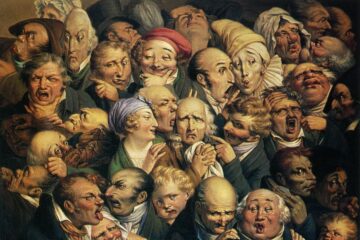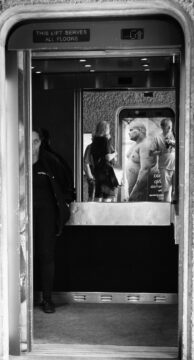by Christopher Horner
Insist on your self; never imitate. —Emerson
How can a man of consciousness have the slightest respect for himself? —Dostoevsky

The key promise of the modern world was the freedom of the individual. It was the motivating cry of the great revolutions of the modern age, meaning two things, at least: first, the removal of the external barriers to freedom: no more oppression by kings and priests, and later, freedom from the democratic masses themselves: the ‘tyranny of the majority’. Second, freedom as the ability to be oneself, to express who one truly is; the ideal of authenticity. The free, unique individual, able at last to to express their unique self. But this ‘real’ self needs to be found in order to be freed, and this has proved to be more difficult than the removal of oppressive rulers.
Authenticity
The authentic self is hard to reach. Something keeps getting in the way. Perhaps the culprit is an inauthentic self, a mask or double woven by social convention, and adopted through self deception. So one becomes two, or perhaps three. The alienated self must discard the false in order to find the True Self. The great task for moderns is to be authentic and unique.
That this should seem natural to us may be because we have been shaped by the brave new world of bourgeois freedom that followed the Age of Revolutions. Mill, Constant, de Tocqueville, Emerson, all have it for their theme, which was also that of much romantic art of the period. Here is Ralph Waldo Emerson, in his essay Self Reliance:
Whoso would be a man, must be a nonconformist. He who would gather immortal palms must not be hindered by the name of goodness, but must explore if it be goodness. Nothing is at last sacred but the integrity of our own mind. [1]
Emerson continues in this vein at some length, in a high flown peroration. He refers repeatedly to the evil effects of the crowd, the multitude the mass of men (it’s always men) who threaten to suffocate the genius of the individual. This can seem like tedious over insistence. It still finds an audience, especially in the self-help and get-ahead-in-business circles that dream of the remarkable person who achieves success, by liberating their unique self with all its talents.
The anxiety in the essay is about the threat of the mediocre masses. Already, claims Emerson, the promise of freedom is under threat -not from kings or despots, but from the majority of one’s fellow citizens. It is a worry we find in JS Mill’s On Liberty, and in de Tocqueville. Being free turns out to be more difficult and more worrisome. For as soon as freedom is announced, so is alienation: from others, from culture, from the free self itself, from the deadening effect of being in society:
Meantime nature is not slow to equip us in the prison-uniform of the party to which we adhere. We come to wear one cut of face and figure, and acquire by degrees the gentlest asinine expression. There is a mortifying experience in particular, which does not fail to wreak itself also in the general history; I mean “the foolish face of praise,” the forced smile which we put on in company where we do not feel at ease in answer to conversation which does not interest us. The muscles, not spontaneously moved but moved by a low usurping wilfulness, grow tight about the outline of the face with the most disagreeable sensation.
The very announcement of freedom and the individual is accompanied with the fear of its extinction. One threat lies without, with the mass of men; the other within. The promise of freedom is that one should fulfil one’s desires, that the herd or mob should not stop the self from finding its happiness in its own way. The question seems to be why that should be so hard, and why freedom should seem such a burden.

Notes from Underground
The suspicion grows that the very desires one has may have an external origin, implanted by forces over which one has no control, desires one may or may not endorse. Either way, the feeling of unfreedom grows, even in the pursuit of what one wants. Anxiety turns to anguish. Here is the voice of Doestoyevesky’s Underground Man:
…..for we are all divorced from life, we are all cripples, every one of us, more or less. We are so divorced from it that we feel at once a sort of loathing for real life, and so cannot bear to be reminded of it. Why, we have come almost to looking upon real life as an effort, almost as hard work, and we are all privately agreed that it is better in books. And why do we fuss and fume sometimes? Why are we perverse and ask for something else? We don’t know what ourselves. It would be the worse for us if our petulant prayers were answered. Come, try, give any one of us, for instance, a little more independence, untie our hands, widen the spheres of our activity, relax the control and we … yes, I assure you … we should be begging to be under control again at once. [2]
Something troubles the modern self. If the ‘subject’ is the empty container of whatever characteristics and desires society shapes in making a ‘personality’ then the impossible thing would be to be authentic. The aspiration remains, but the double self comes more readily.
A Fool’s Truth
An early expression in fiction of that duality arrives in Diderot’s Rameau’s Nephew (written sometime before 1774). In it a narrator, ‘I’, converses with the the Nephew ‘he’, the most unreliable, ironical, two faced and apparently cynical individual. Crime, gold, hypocrisy are all are extolled. The truth, we hear from him, is that for all the prating about integrity and virtue, the real values are those of personal advantage, the real goal is to be an successful actor. Above all, one must not be taken in by the false words one speaks. It’s all a sham. Some samples:
– If there is one realm in which it is essential to be sublime, it is in wickedness. You spit on a petty thief, but you can’t deny a kind of respect for the great criminal.
– People praise virtue, but they hate it, they run away from it. It freezes you to death, and in this world you’ve got to keep your feet warm.
– Gratitude is a burden, and all burdens are made to be cast off.
One gets the impression that ‘he’ is the Id of the bourgeoisie, speaking the nocturnal obscenities that must not be uttered in daylight. The fool that speaks truth.
First published in German translation by Goethe in 1805, the voice of the Nephew reappears in was Hegel’s Phenomenology of Spirit (1807). The Nephew is the very type of the witty single self that uses language and a talent for performing the self, as a means to survive in society. And it knows this about itself. Entirely groundless, there is nothing the self has but itself, and it knows it is the servant of whatever a client will pay. Such extreme alienation seems a kind of liberation: at least one is not taken in by the comfortable bromides of the cultured world.
Embracing Alienation
We might think that contradiction and alienation are there to be abolished. But this is not so. A degree of alienation is constitutive of the subject. For there is no authentic self, lying at the bottom of the subject, waiting to be found and ‘expressed’. What there is, is a divided self: for nothing and no one is at one with itself. I am not entirely identified with my world, with my actions, and this is kind of freedom. This doesn’t mean we must emulate Diderot’s prancing cynic, but we can certainly learn from him.
Embracing alienation means seeing desire and enjoyment in a different way. Desire is contagious: we catch desires more easily than we do the common cold: all desire is the desire of the other[4]. Rather than looking for the authentic self, we need to locate the authentic passion: the Thing that is your own, and that you must insist on. This might be in art, in work, in love or anything that truly moves us. Our alienation is our freedom. Freedom isn’t in the free floating self of Rameau’s Nephew, or the canting self of Emerson, but in her that can live with alienation and contradiction. Don’t look for your ‘real’ self: it isn’t there.

[1] Ralph Waldo Emerson, Self Reliance, https://www.gutenberg.org/files/2944/2944-h/2944-h.htm#link2H_4_0002
[2] Fyodor Dostoyevsky, Notes from the Underground, https://gutenberg.org/cache/epub/600/pg600-images.html
[3] Denis Diderot, Rameau’s Nephew , https://gutenberg.net.au/ebooks07/0700101h.html
[4] A much repeated formula of Jacques Lacan, https://iep.utm.edu/lacweb/#SH2b
See also: Todd McGowan’s Embracing Alienation, Repeater Books, 2024, which explores the idea that alienation is constitutive of the subject. The notion that alienation is constitutive in the way I have argued above stems from contemporary readings of Hegel and Lacan, and McGowan is one of the best guides to this line of thought. I have obviously drawn heavily on him here, although my line of argument is my own responsibility, for good or ill.
I got the idea of thinking Self Reliance and Notes From Underground together from Roger Gathman, perhaps appropriately, from a Facebook post. He’s not to be blamed for what I did with the idea.
